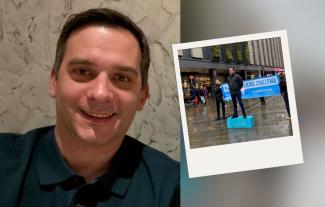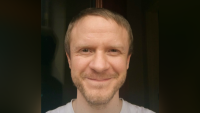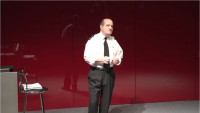I realised I had to do something about my avoidance

Jon Hubbard tells us how hiding his stammer left him living in fear, and the course that helped him.
It wasn't until I was 8 or 9 that I realised I was different to others in the way I spoke. I noticed that I would repeat words more than other kids or have difficulty expressing what I was trying to say.
I was never really bullied throughout school, but there were plenty of light-hearted jokes at my expense that stuck with me. I started to dread having to speak in class, and even had an agreement with the school that I didn't have to read aloud.
Avoidance, however, meant the anxiety around talking and being 'found out' as a person who stammered increased as I got older.
Becoming covert
I became 'covert' — I did everything I could to hide my stammer. I would avoid situations where I might have to speak and I'd think ahead and switch any words I might block on. This was really tiring, as you spend the entire time thinking about what you're going to say and don't really listen to what the other person is talking about!
I feared even the simplest of situations — calling the doctor because I knew I'd block on my name and they'd put the phone down on me. Only ordering food I could say rather than what I wanted.
...the anxiety around talking and being 'found out' as a person who stammered increased as I got older.
This followed into University. I'd be quite happy to spend days working on an assignment and have someone else present it on the day. They'd be happy as they didn't have to do any of the work! It was a great solution. At the time.
This just furthered my anxiety around speaking so when I started work, I really struggled. I used to virtually hide under my desk when using the phone so people didn't hear what I was saying. I would avoid meetings where you had to do the round table introductions for fear of saying my name when it was my turn. Anyone else had that awful 'did you forget your name?' comment? It's so degrading.
The turning point
I finally realised I had to do something about it when I went to collect my daughter from school. The teacher asked me who I was there to collect. I had a huge block on my daughter's name so just pointed and said, "That one". The look on the teacher's face — horrified that I might have forgotten my own daughter's name (or worse, trying to collect a random child!). I don't think I'd ever felt so low about my speech.
I tried different speech therapies in the past — from traditional therapy to electronic devices — but nothing really helped. I still had that fear of stammering no matter what I tried.
I joined the McGuire Programme in 2018 as a last resort. I was so nervous I called up to cancel my place but was reassured by the course organiser that there was no need to worry, and just to come along and see what it was all about.
Anyone else had that awful 'did you forget your name?' comment? It's so degrading.
It was like a weight had been lifted from my shoulders — to meet so many other people who stammered, in the same room, all working on their speech. It was such a great feeling of inclusion and I instantly knew I was in the right place.
I learned techniques to control my stammer rather than try to 'get round' or hide it. This was a scary experience at first as I'd hid it for so long. During the course we spent a lot of time addressing the psychological elements of a stammer — the fear, the guilt, the embarrassment — and how to change our perceptions. This is when I realised the Programme was different as I'd never received that kind of support before.
On the last day there were speeches, including a public speaking challenge in front of up to 150 people in a town centre. If you'd have told me even a week before I joined that I'd be capable of doing that, I would have just laughed! It was scary but so powerful, to be able to stand up and speak in control like that is a feeling you never forget.
It's a corny phrase to use but the Programme really has been life-changing for me. Sure, I have more control over my stammer (it's not cured, there is no cure), but the simple fact I have accepted it is amazing.
I never spoke to family about this 'big secret'; it was the elephant in the room. I never spoke about it at work or with friends. Now I'll happily bore anyone who will listen!
Small victories
Since joining I've pushed myself more than I ever would. I no longer avoid meetings at work; in fact I often lead them. I'm a UK Works Council representative too now, meaning I regularly lead difficult and high profile meetings, something I'd never have done before.
I'm also a School Governor at the local high school. Regularly meeting with the Senior Leadership team and not being afraid to challenge them when needed — again, is something I'd never have dreamed of doing before 2018.
One of the best things for me though, is what I call the 'small victories'. The ability to say your name whenever you need… to pick up my daughter from school, order the food I actually want or call to make an appointment. Things fluent people take for granted every day that I just couldn't do.
I even did a radio piece on BBC Hereford and Worcester last week. I've got the bug and will be making it my mission to do more for raising stammering awareness!
The McGuire Programme is one of a number of courses for people who stammer. Read all about the range of options on our One-to-one Adult Speech & Language Therapy and Adult Stammering Courses pages.
Read more Your Voice articles from people who stammer and their allies. Would you like to write something? See Submit Something For The Site or email editor@stamma.org for details.

































